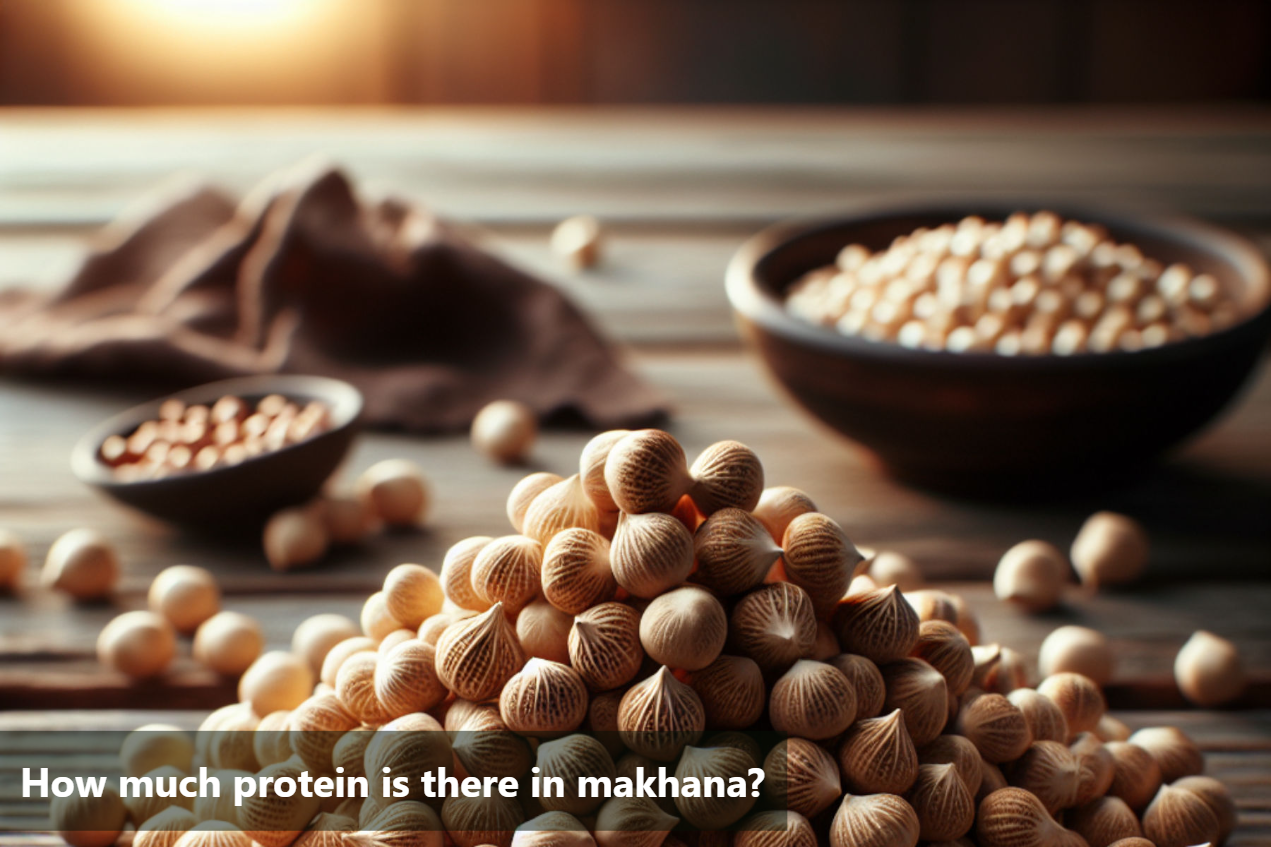
How much protein is there in makhana?
Makhana, also known as fox nuts or lotus seeds, is a popular snack enjoyed for its crunchy texture and numerous health benefits. These small round seeds come from the Euryale ferox plant and have been a part of traditional Asian cuisine for centuries.
One of the key reasons makhana has gained popularity is its impressive nutritional content. It serves as an excellent source of protein, making it a fantastic option for individuals looking to boost their protein intake. In fact, makhana contains around 9-10 grams of protein per 100 grams, making it a valuable protein-rich snack.
Incorporating makhana into your diet can provide you with a healthy dose of this essential macronutrient, supporting muscle growth, repair, and overall well-being. In addition to being a good source of protein, makhana is also low in calories and rich in other nutrients like calcium, magnesium, and phosphorus. This superfood's versatility in both sweet and savory dishes makes it an appealing and nutritious choice for health-conscious individuals.

Nutritional Profile of Makhana
100 grams of Makhana contains:
Calories |
347 |
Protein |
9.7gm |
Fats |
0.1gm |
Carbohydrates |
76.9gm |
Fibre |
14.5gm |
Total Lipids (Fats) |
0.1gm |
Calcium |
60mg |
Iron |
1.4mg |
Health Benefits
Rich in Protein: Makhana is a good source of protein, aiding in muscle repair and growth.
Low in Calories: Makhana is low in calories, making it a suitable snack option for weight management.
High in Fiber: Makhana is rich in dietary fiber, promoting digestive health and aiding in weight loss.
Rich in Antioxidants: Makhana contains antioxidants that help fight oxidative stress and reduce the risk of chronic diseases.
Gluten-Free: Makhana is naturally gluten-free, making it suitable for individuals with gluten intolerance or celiac disease.
Low Glycemic Index: Makhana has a low glycemic index, helping regulate blood sugar levels and reducing the risk of insulin spikes.
Ways to Incorporate Protein-rich Makhana in Your Diet
Here are some creative suggestions and easy recipes to help you make the most of makhana:
Roasted Makhana Snack:
Toss makhana with a drizzle of olive oil and sprinkle of spices like turmeric, cumin, and paprika.
Roast them in a pan until crunchy for a guilt-free and protein-packed snack.
Makhana Trail Mix:
Combine roasted makhana with nuts, seeds, and dried fruits for a wholesome trail mix.
A perfect on-the-go snack that provides a protein punch.
Makhana Kheer:
Cook makhana with milk, cardamom, and jaggery for a nutritious and delectable dessert.
A comforting treat that satisfies your sweet cravings while boosting your protein intake.
Makhana Curry:
Add makhana to your favorite curry recipe for a unique texture and extra protein.
Pair it with rice or roti for a wholesome and delicious meal.
With these creative ideas, incorporating protein-rich makhana into your diet is not only easy but also enjoyable. Let the versatility of makhana enhance your meals and contribute to your daily protein goals.

Unveiling the Protein Content of Makhana
Makhana emerges as a remarkable source of protein, making it a valuable addition to a healthy diet. With approximately 9-10 grams of protein per 100 grams of makhana, it stands out as a plant-based protein option that can support various dietary preferences. The protein content in makhana competes well with other protein sources, proving to be an excellent choice for individuals seeking to boost their protein intake through natural means.
Incorporating makhana into one's diet comes with a multitude of benefits beyond its protein content. The rich nutritional profile of makhana, including low fat and sodium levels, makes it a wholesome snack or ingredient in various dishes. Its versatility allows for creative culinary exploration, from roasted makhana snacks to makhana curry recipes, catering to diverse taste preferences and dietary requirements.
By recognizing the protein content in makhana and understanding its role in fostering a balanced diet, individuals can make informed choices to enhance their overall nutrition. So, next time you are looking for a protein-rich and nutritious option, consider reaching for makhana to savor its benefits for your health and well-being.
FAQs
-
How much protein is there in makhana?
Makhana, also known as fox nuts or lotus seeds, is a good source of protein. A 100-gram serving of dried makhana contains approximately 9 grams of protein.
-
Is makhana a high-protein snack?
Yes, makhana can be considered a high-protein snack option compared to many other snacks. It provides a decent amount of protein while being low in fat.
-
Can makhana be a part of a protein-rich diet?
Certainly! Incorporating makhana into your diet can contribute to meeting your protein requirements, especially if you are following a vegetarian or plant-based diet.
-
Are there other nutrients in makhana besides protein?
In addition to protein, makhana is also a good source of various other nutrients like carbohydrates, fiber, vitamins, and minerals, making it a nutrient-dense snack.
-
How can I include makhana in my diet to boost protein intake?
You can enjoy makhana as a crunchy snack on its own, use it in recipes like kheer or curries, or even roast and season it for a flavorful protein-rich snack option.
This Blog post is an initiative by Lo! Foods, to provide accurate and Nutritionist / Doctor approved information related to Health. Lo! Foods is India's leading brand for Everyday Functional Foods. Foods designed for specific Health conditions or Needs. Lo! Foods also runs India's largest range of Low Carb Healthy Cloud Kitchens, under the brand names of Lo!, ProteinChef, ATH (All Things Healthy) and DiabeSmart.













Leave a comment
Your email address will not be published.